

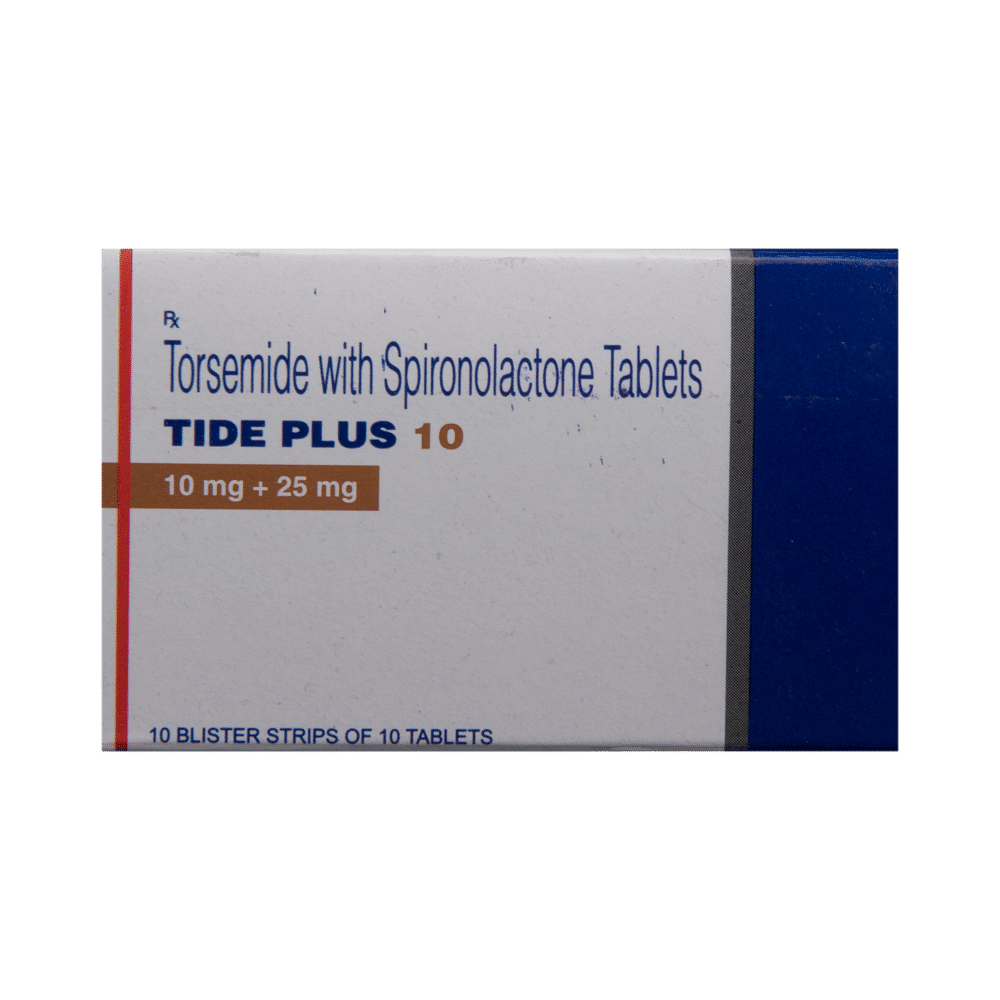
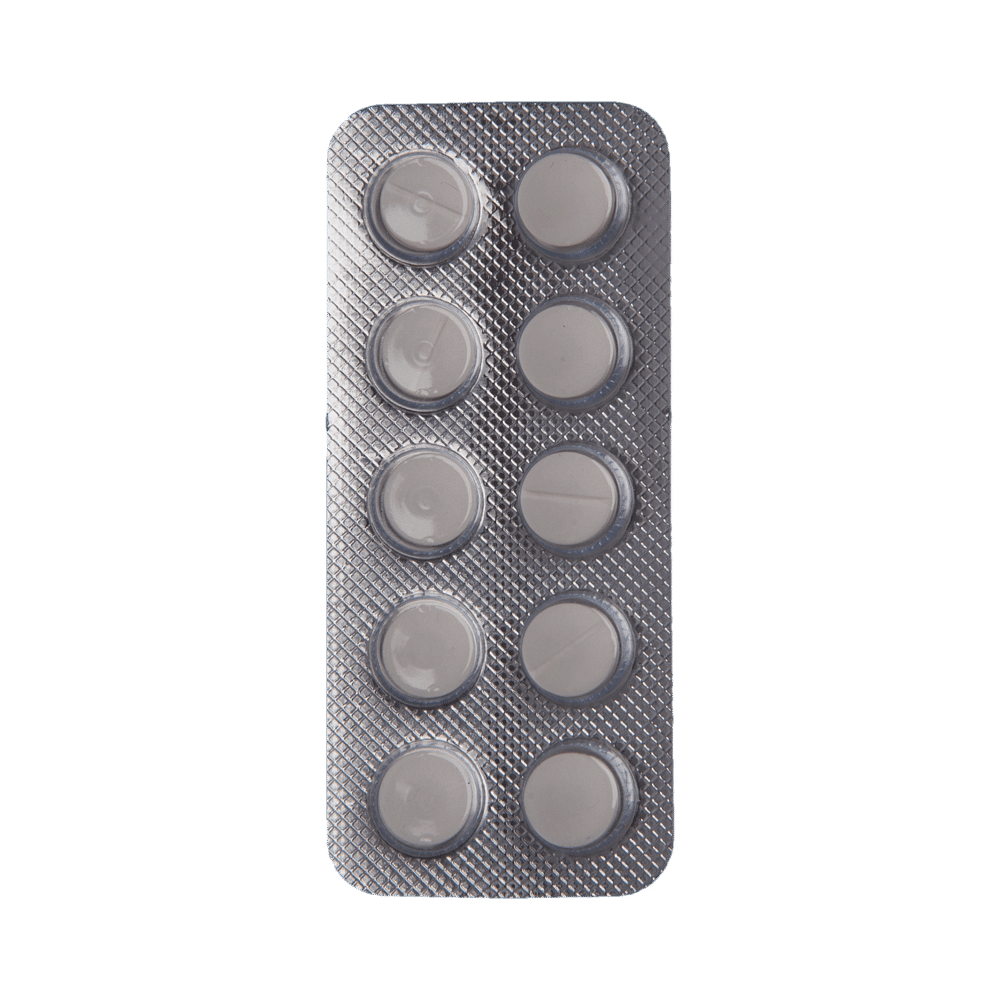
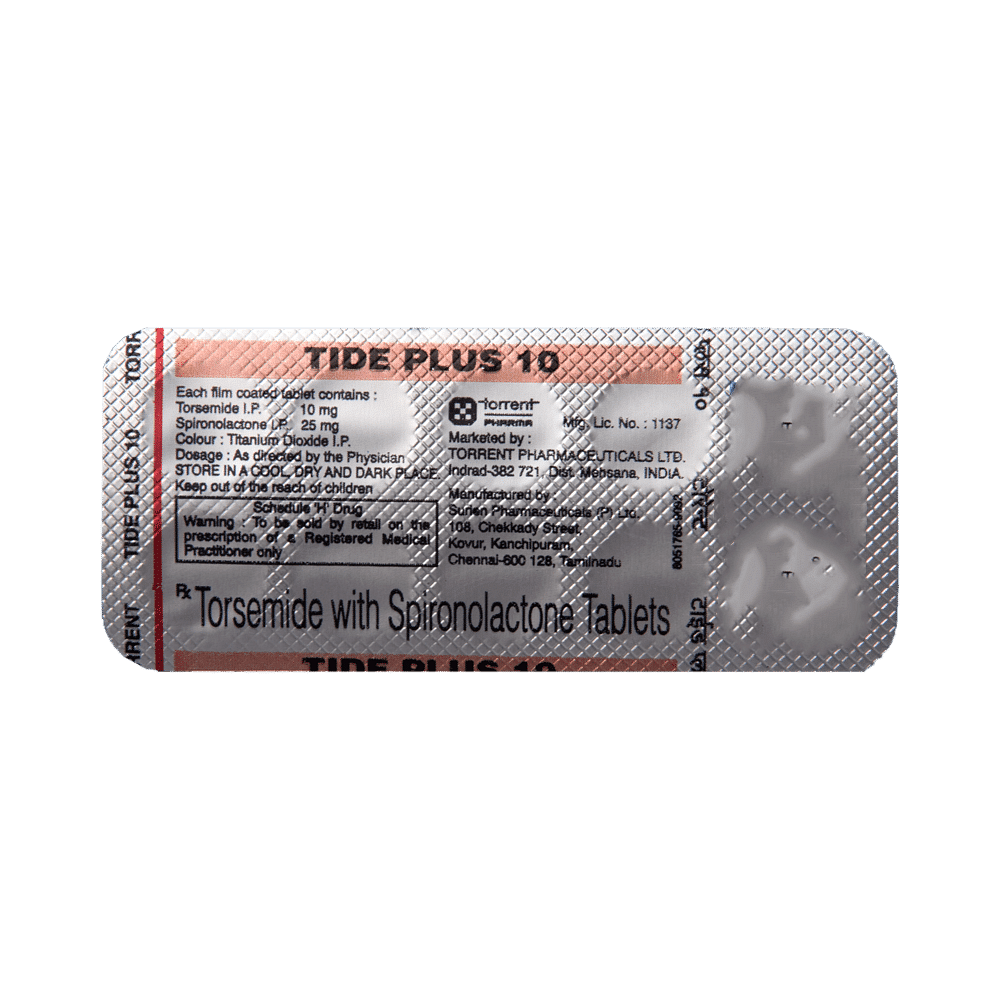
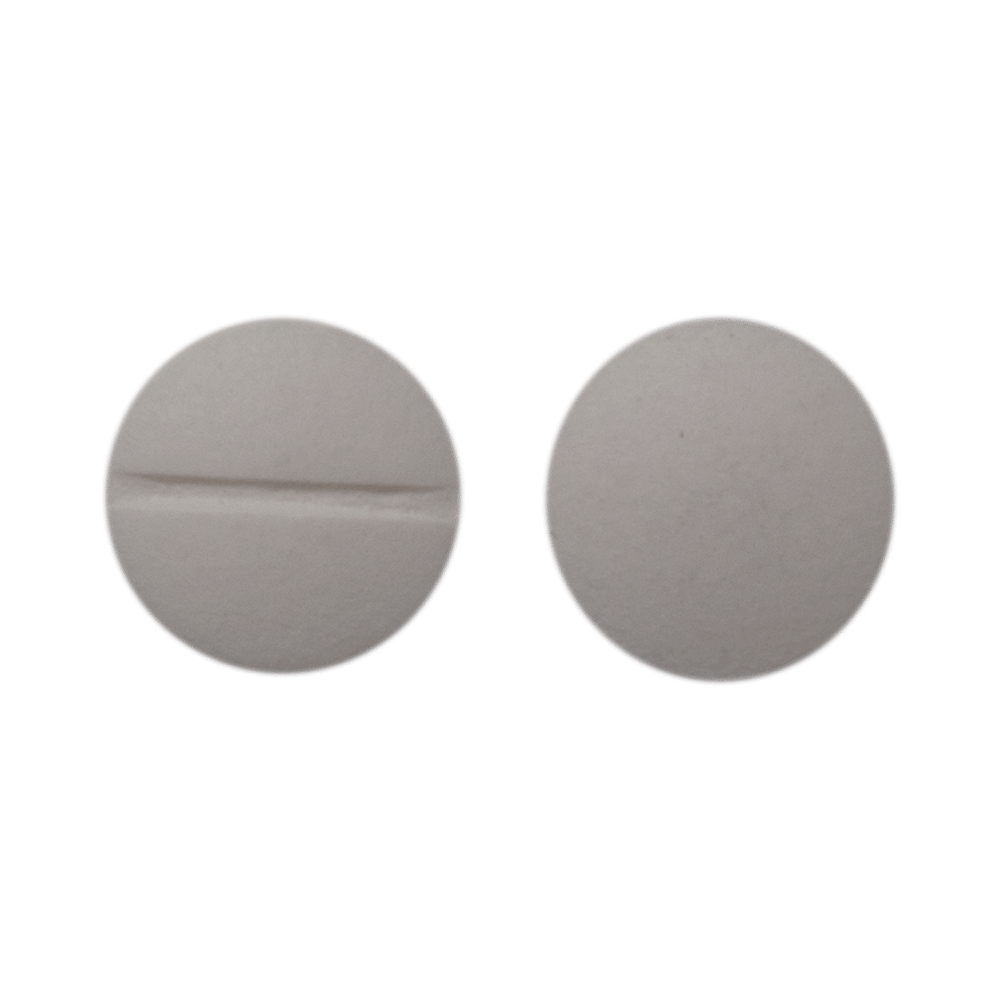
Tide Plus 10 Tablet
Manufacturer
Torrent Pharmaceuticals Ltd
Salt Composition
Torsemide (10mg) + Spironolactone (25mg)
Key Information
Short Description
Tide Plus 10 Tablet is a combination of two medicines used to reduce excess fluid levels in the body while maintaining the potassium balance.
Dosage Form
Tablet
Introduction
Tide Plus 10 Tablet is a combination of two medicines used to reduce excess fluid levels in the body while maintaining the potassium balance. It is used to treat edema (fluid overload) and some cases of hypertension.
Directions for Use
Take this medicine in the dose and duration as advised by your doctor. Swallow it as a whole. Do not chew, crush or break it. Tide Plus 10 Tablet is to be taken with food.
Safety Information
Side Effects
No common side effects listed.
Alcohol Warning
It is unsafe to consume alcohol with Tide Plus 10 Tablet.
Breastfeeding Warning
Tide Plus 10 Tablet is probably safe to use during breastfeeding. Limited human data suggests that the drug does not represent any significant risk to the baby.
Pregnancy Warning
Tide Plus 10 Tablet may be unsafe to use during pregnancy. Although there are limited studies in humans, animal studies have shown harmful effects on the developing baby. Your doctor will weigh the benefits and any potential risks before prescribing it to you. Please consult your doctor.
How it works
Tide Plus 10 Tablet is a combination of two medicines: Spironolactone and Torasemide.
Quick Tips
Tide Plus 10 Tablet helps removes excess water from your body. Take it in the morning with breakfast to avoid getting up at night to urinate. It may cause dizziness or sleepiness. Don't drive or do anything requiring concentration until you know how it affects you. To lower the chance of feeling dizzy or passing out, rise slowly if you have been sitting or lying down. It may cause excessive urine production, dehydration, and low electrolyte levels. Notify your doctor if you experience dizziness, tiredness, or muscle weakness that doesn't go away.
Related Medicines
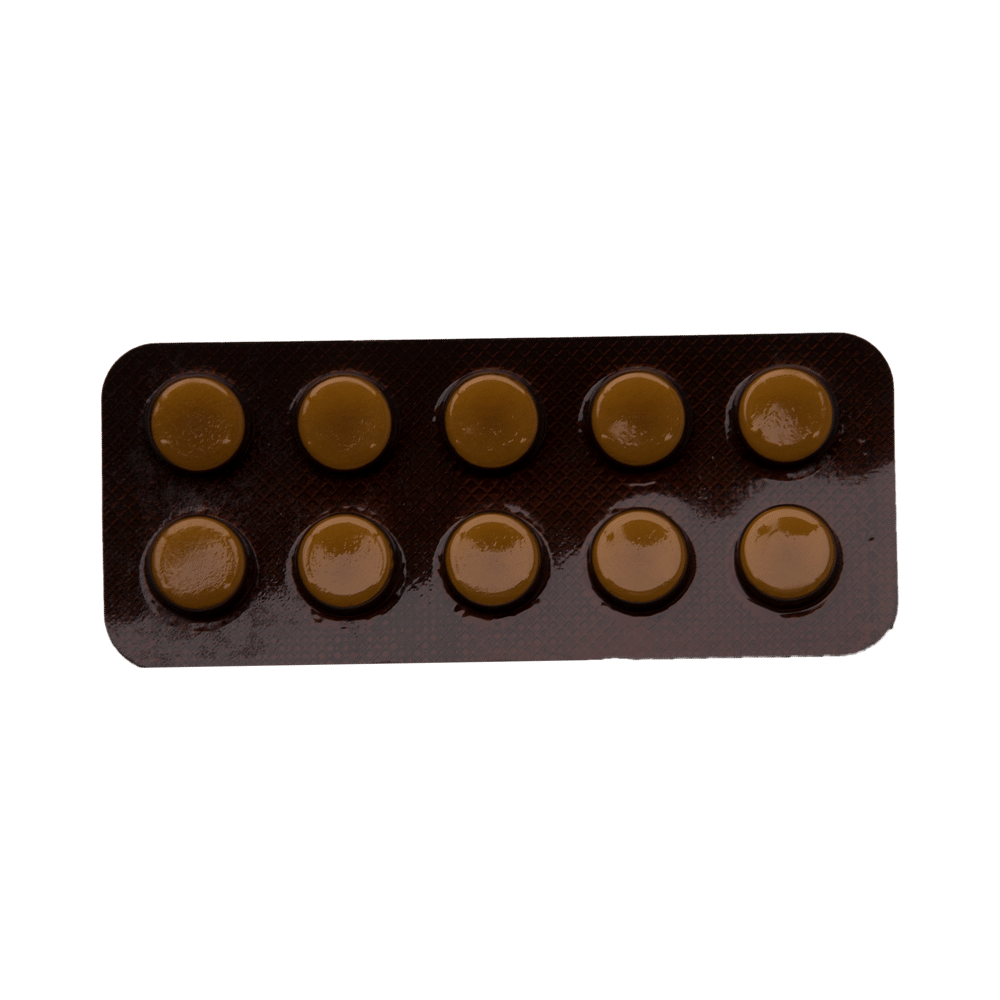
Torsinex Plus Tablet
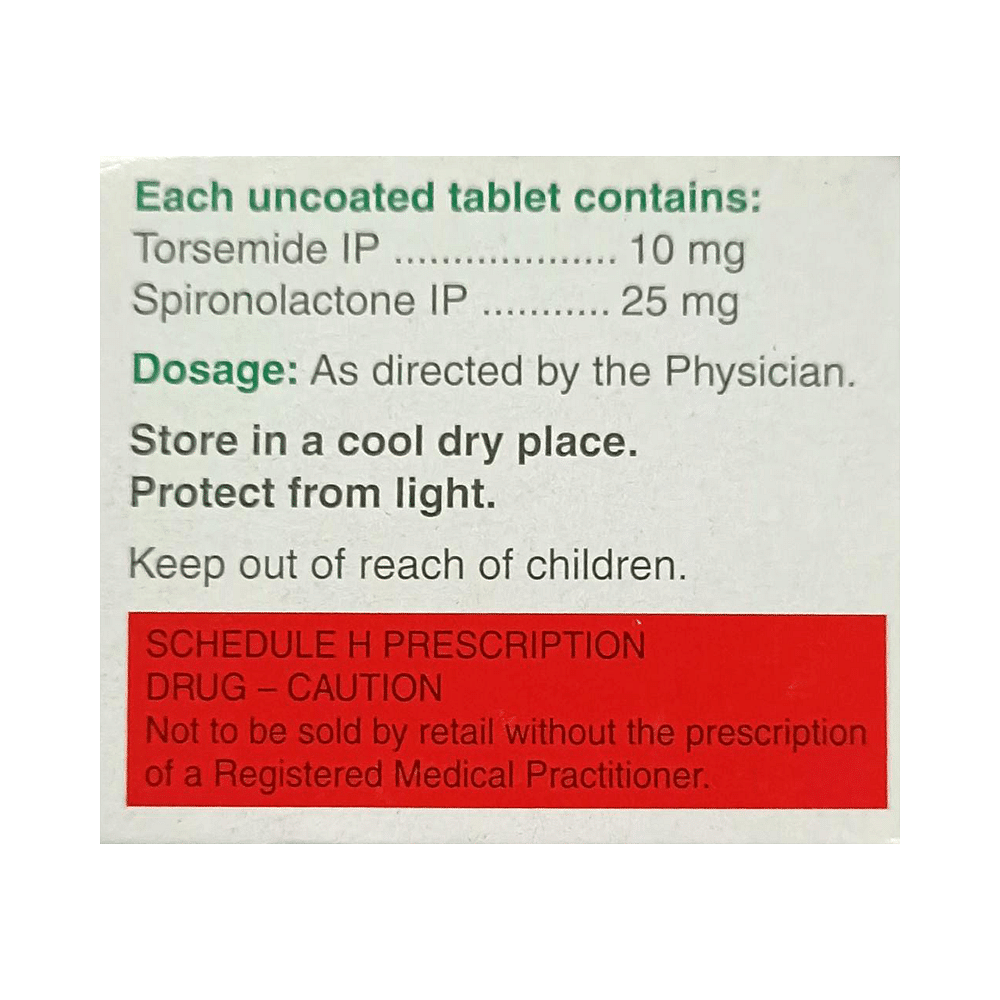
Dytor Plus LS 10 Tablet

Torlica Plus Ls 25mg/10mg Tablet

Tortone 25mg/10mg Tablet

Tornice Plus 25mg/10mg Tablet

Torsimax Plus 25mg/10mg Tablet

Semitor Plus 25mg/10mg Tablet

Jbtor Plus 25mg/10mg LS Tablet

Litrakind Plus 25mg/10mg Tablet

Torse S 25mg/10mg Tablet
Frequently asked questions
Can the use of Tide Plus 10 Tablet cause dizziness?
Yes, some patients who take Tide Plus 10 Tablet may feel dizzy or lightheaded. If you experience dizziness, it is recommended to rest for a while and resume your activities when you feel better. Avoid operating heavy machinery or driving if you feel dizzy.
Can the use of Tide Plus 10 Tablet cause gout?
Yes, taking Tide Plus 10 Tablet can increase blood uric acid levels, which may trigger a gout attack. If you have hyperuricemia or a history of gout, inform your doctor before using this medicine. It is also essential to avoid using Tide Plus 10 Tablet if you have gout.
Can the use of Tide Plus 10 Tablet cause dehydration?
Yes, some patients who take Tide Plus 10 Tablet may experience excessive fluid loss, leading to dehydration. This can manifest as dry mouth, thirst, drowsiness, muscle pain, weakness, fatigue, low blood pressure, decreased urination, increased heart rate, nausea, and vomiting. Inform your doctor if you experience persistent issues while taking this medicine.
Can the use of Tide Plus 10 Tablet cause hyperkalemia?
Yes, taking Tide Plus 10 Tablet can lead to high potassium levels in some patients, especially those with underlying kidney disease or excessive potassium intake. High potassium levels can be life-threatening and require immediate medical attention. Regular electrolyte and kidney function tests are essential while using this medicine.
What are the contraindications for using Tide Plus 10 Tablet?
Tide Plus 10 Tablet should not be used in patients with hypersensitivity to torasemide, sulfonylureas, or spironolactone. It is also essential to avoid this medicine in patients with anuria, acute renal insufficiency, hepatic coma, low blood pressure, cardiac arrhythmias, aminoglycosides or cephalosporins treatment, kidney dysfunction due to drug-induced damage, hyperkalemia, Addison's disease, and moderate to severe renal impairment in children.
What is the recommended storage condition for Tide Plus 10 Tablet?
Store Tide Plus 10 Tablet in its original container or pack, tightly closed. Follow the storage instructions provided on the pack or label. Dispose of any unused medicine properly and ensure it is not consumed by pets, children, or other people.
What is Tide Plus 10 Tablet?
Tide Plus 10 Tablet is a fixed-dose combination of torasemide (a loop diuretic) and spironolactone (an aldosterone antagonist). Both are diuretics that help remove excess fluid from the body. This combination is used to treat conditions like congestive heart failure, nephrotic syndrome, liver cirrhosis with fluid retention, and swelling of the abdomen.
Is it safe to use Tide Plus 10 Tablet?
Yes, Tide Plus 10 Tablet is generally safe for most patients. However, some common side effects include dizziness, dehydration, decreased sodium levels in blood, breast enlargement in males, decreased magnesium and calcium levels in blood, and increased blood uric acid. Inform your doctor if you experience any persistent problems while taking this medicine.


